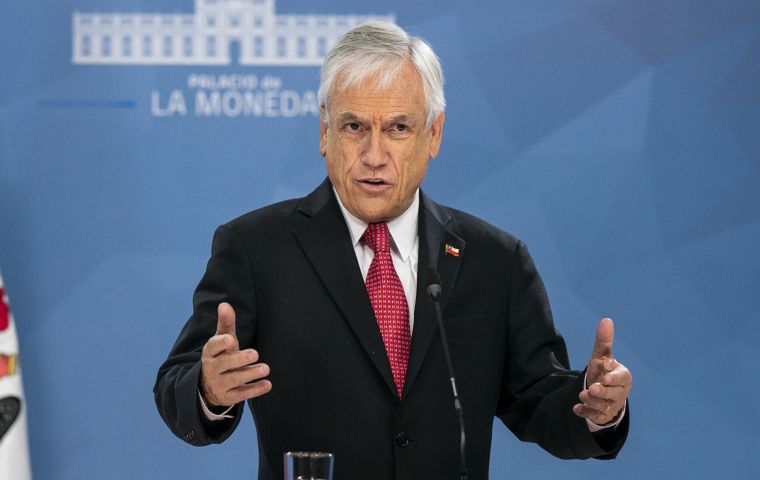MercoPress. South Atlantic News Agency
New limits dispute arises between Chile and Argentina
 “If we do not reach an agreement, there are many other instruments at the international level,” said Piñera
“If we do not reach an agreement, there are many other instruments at the international level,” said Piñera A new controversy regarding boundaries between Chile and Argentina has erupted following the issuance of charts allegedly violation of a 1984 treaty.
“What Chile is doing is exercising its right and declaring its continental shelf,” said Chilean President Sebastián Piñera Sunday. “What we are doing as a government is a process of continuity of foreign policy and we hope in November to send to the Commission on the Limits of the Continental Shelf of the United Nations the continental shelf west of the Antarctic peninsula,” he added.
Piñera's statement came after Argentina had argued that Chile intended to seize “a part of the Argentine continental shelf and an extensive area of the seabed and ocean, a maritime space that is part of the Common Heritage of Humanity. following the United Nations Convention on the Law of the Sea.”
The Chilean President also said “we will have to see how to solve it and the first path is dialogue. We are absolutely open, and so we have discussed it with President (Alberto) Fernández when he visited Chile, to seek ways of dialogue to resolve this issue. If we do not reach an agreement, there are many other instruments at the international level.“
Also read: Chile and Argentina agree to discuss ongoing continental shelf differences south of Cape Horn
Argentina's Foreign Ministry Saturday said that the Chilean government's measure to project its continental shelf east of the 67º 16 '0 meridians ”clearly does not coincide with the Treaty of Peace and Friendship concluded between the two countries in 1984,“ and recalled that the limits to Argentina's maritime operations were unanimously approved by Congress based on a definition drafted by the United Nations.
The Government of Argentina first learned of the new developments when they were published on Aug. 23 in Chile's Official Gazette, relating to maritime spaces. ”This measure aims to project the continental shelf east of the 67º 16'0 meridian, which clearly does not adjusts to the Peace and Friendship Treaty signed by both countries in 1984,“ a statement released Saturday by the Foreign Ministry read.
It also highlighted that ”the outer limit of the Argentine continental shelf in this area is reflected in National Law 27,557, approved on August 4, 2020, unanimously in both Houses of Congress and signed into law on August 24 of that same year.“
The document also pointed out that ”said the law does nothing but collect in an internal norm the timely presentation made by the Argentine Government on the said area before the Commission on the Limits of the Continental Shelf (CLPC).“
”This presentation is fully in line with the Treaty of Peace and Friendship and was approved without question by said Commission to establish a definitive and mandatory maritime boundary in accordance with the United Nations Convention on the Law of the Sea (Convenor). Neither the presentation nor the decision of the Commission was contested by Chile,“ the Argentine Foreign Ministry further explained.
”The measure attempted by Chile seeks to appropriate part of the Argentine continental shelf and an extensive area of the seabed and ocean, a maritime space that is part of the Common Heritage of Humanity in accordance with the United Nations Convention on the Law of the Sea,” it added.
Meanwhile, voices from various parts of Chile's political spectrum supported Piñera.
Chilean Foreign Minister Andrés Allamand said his country “has previously pointed out that the crescent requested by Argentina was unenforceable,” while former Foreign Minister Heraldo Muñoz also defended Chile's new nautical charts.
Former Chilean Ambassador to Buenos Aires José Antonio Viera-Gallo explained that this conflict is an objective difference that is contemplated in the sea convention, but there is no mechanism to resolve it.
Deputy Jaime Naranjo, who heads the House's Foreign Relations Committee, insisted that the conflict should be resolved through dialogue and not through confrontation.
Senator Kenneth Pugh said it was not acceptable that Argentine authorities were claiming Chile was seizing “something that belongs to us under international law; Chile is the southernmost country in the world and we will defend our rights, with will and determination,” he stressed.




Top Comments
Disclaimer & comment rulesCommenting for this story is now closed.
If you have a Facebook account, become a fan and comment on our Facebook Page!